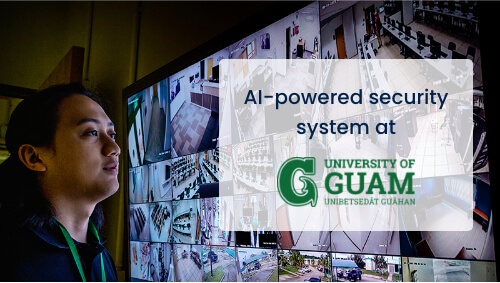A new generation of surveillance and monitoring tools arrived at the University of Guam.
For the first time, artificial intelligence, or AI, cameras are being tested in the UOG Office of Information Technology through the DOCOMO 5G Open Partner Program, which provides global businesses and organizations with the latest 5G information, test environments, and partner workshops.
As one of the AI systems in the Program, Sentry AI focus on learning over time how to automatically spot suspicious behavior through a CCTV (closed-circuit television) feed, while recognizing and tracking who is present and when.

Sentry AI system overlay on a live CCTV stream to study and differentiate movements. In what is known as deep learning, the Sentry AI has spent several months observing and learning “typical” behaviors in the IT office. The AI captures and flags out-of-the-ordinary situations and sends a message or photo via alerts, either through SMS texts or email, as immediately as the incident happens.
The technology, for example, could differentiate between a person walking to the office during a regular working day versus someone suspicious with a covered face or carrying a weapon or someone who otherwise shouldn’t be in an area.
The primary objective with these technologies is to verify the AI’s ability to operate on DOCOMO PACIFIC’s 5G network versus its 4G network. The lower latency of the 5G network allows cameras to transmit high-quality video to Sentry AI, which then recognizes people and activities with higher accuracy. For example, in addition to recognizing people by face, Sentry AI can process live video to identify people uniquely by their body shape and walking patterns, even when a face is not clearly visible.
For University of Guam, having an AI CCTV system could help identify potential threats around campus in real time, which would allow for quicker response times.
“With these projects, we’re getting the opportunity to explore the capabilities and benefits of the latest AI technology, which may lead us to new ways to improve the security, safety, and function of our campus,” said Manny B. Hechanova, UOG’s interim chief information officer.


